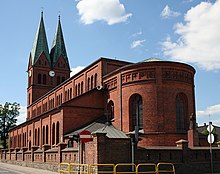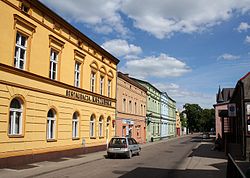|
Brusy
Brusy [ˈbrusɨ] (Kashubian: Brusë; formerly German: Bruß) is a town in northern Poland, located in the Chojnice County in the Pomeranian Voivodeship. As of June 2023, the town has a population of 5,103.[2] History Brusy was a royal village of the Polish Crown, administratively located in the Tuchola County in the Pomeranian Voivodeship.[3] Since the 19th century Brusy was an important center of the Kashub movement, although a fair amount of Kashubians from Brusy emigrated to Winona, Minnesota in the late 1900s.[4] In 2007, the ninth Congress of Kashubians was held here, and in 2012, the annual Kashubian Unity Day celebration was conducted here. A Kashubian secondary school is also located in the town. In the interwar period, it was administratively located in the Chojnice County in the Pomeranian Voivodeship of Poland. According to the 1921 census, Brusy had a population of 2,260, 98.2% Polish.[5] During the German occupation of Poland (World War II), inhabitants of Brusy were among over 450 Poles massacred by the Germans in autumn of 1939 in the Igielska Valley.[6] In November 1939 the SS, Gestapo and Selbstschutz murdered local Polish teachers in a large massacre of Polish teachers near Skarszewy.[7] Further executions of local Poles were carried out in January 1940 in the Igielska Valley and in the fields near Chojnice.[8] In May 1942, the Germans expelled dozens of Poles, whose farms were handed over to Germans as part of the Lebensraum policy.[9] The secret Polish resistance organization Pomeranian Griffin (Gryf Pomorski) operated in the Brusy area under the leadership of Colonel Józef Wrycza, who was also a Roman Catholic priest. The Germans set up a Waffen-SS training ground in the vicinity, and located its administration in Brusy.[10] Brusy was also the location of the Nazi German Bruss subcamp of the Stutthof concentration camp, in which around 500 female prisoners were held as forced labour.[11] It has obtained town rights on 1 January 1988.[1] Notable people
See alsoReferences
External links |
||||||||||||||||||||||||||||||||||||||||||||




